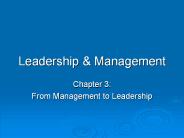LEADERSHIP - PowerPoint PPT Presentation
Title:
LEADERSHIP
Description:
LEADERSHIP Attributed Power ... 2. Expert Power having the knowledge or skill to facilitate the work of the group. 3. – PowerPoint PPT presentation
Number of Views:1648
Avg rating:3.0/5.0
Title: LEADERSHIP
1
(No Transcript)
2
(No Transcript)
3
LEADERSHIP
- Attributed Power perception among group members
or others outside of the group of the leaders
ability to lead. - Actual Power workers resources for changing
conditions inside and outside the group
4
LEADERSHIP
- 7 Power Bases of Actual Power
- 1. Connection Power being able to call on or
use influential people or resources. - 2. Expert Power having the knowledge or
skill to facilitate the work of the group. - 3. Information Power possessing information
that is valuable to and needed by others. - 4. Legitimate Power holding a position of
authority and the rights that accrue to that
position in the organization or larger social
system
5
LEADERSHIP
- 5. Reference Power being liked and admired
the group workers want to be identified with the
worker. - 6. Reward Power being able to offer social
or tangible rewards. - 7. Coercive Power being able to sanction,
punish, or deny access to resources and
privileges.
6
- LEADERSHIP POWER
7
- Workers should begin to share power as rapidly as
possible - 1. Encouraging member-to-member
communications - 2. Asking for members input agenda,
future direction - 3. Supporting indigenous leadership
- 4. Encouraging attempts at mutual sharing
and aid among members
8
- Products of Democratic groups were
qualitatively superior to those of groups that
used Autocratic or Laissez-faire styles of
leadership.
9
Factors Influencing Group Leadership
- 1. Leadership expectations of members
- 2. The way leadership has been attained
- 3. Competition between designated leaders and
indigenous leadership - 4. Needs, tasks, and goals of the group as a
whole - 5. Task and socio-emotional skills of members
- 6. Nature of authority within and outside the
group - 7. Environmental demands placed on the group
and its leadership
10
- Transformational Leadership
- Focuses on inspiring and empowering members
rather than inducing compliance - Interactional Leadership
- Leadership is derived from the interactions of
the group, its members, the designated leader,
and the environment.
11
Factors to be considered when leading a group
- 1. Purpose(s) of the group
- 2. Type of the problem
- 3. Environment
- 4. Group as a whole
- 5. Group members
- 6. Group leader
12
Group Leadership Skills
- Facilitating group processes
- Data gathering and assessment
- Action































